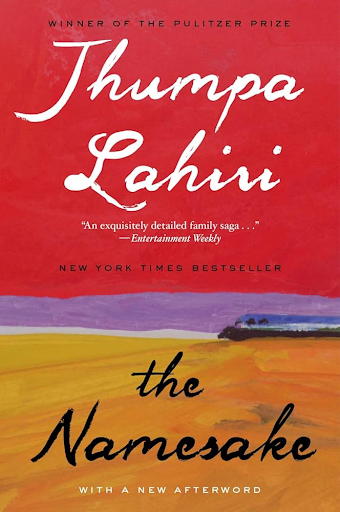
The Namesake, a novel written by Jhumpa Lahiri, has been globally recognized, translated into numerous languages, and even adapted into a film. It is a fictional story centered around Gogol Ganguli, the son of two Indian Immigrants, living in Massachusetts and yearning for a different name than the one he was given. He despises the name Gogol, a title not even common in his homeland, something that haunts him throughout the book and his life.
Gogol’s grandmother was supposed to name him, she was supposed to send a letter to Ashima and Ashoke that declares their child’s lifelong title. But the letter mysteriously never came, and his parents decided to name him after Ashoke’s favorite author, Nikolai Gogol. Little did they know how much trouble that would bring to their son’s identity.
Gogol’s parents, Ashima and Ashoke Ganguli, are lonely yet loving individuals struggling to be Indian parents to their American children. They feel at home only on their trips to Calcutta, with their own families surrounding them. Gogol and his sister, Sonia, brush off this fact, wanting to go to their own home in America, packed with fluffernutter sandwiches and colored pencils, instead of sleeping with mosquito nets and eating chicken curry and rice with their hands as their utensils. Ashima and Ashoke clash with their children in regards to cultural matters. They yearn to show Sonia and Gogol their Indian roots, but they go unnoticed in lieu of Ivy Leagues and frigid Boston winters.
Gogol grows up through The Namesake, transforming from an innocent boy living with his family in a humble New England home into an architect residing in New York City, distanced from his family and stained by his relationships with others. But throughout his life, Gogol has one large regret that looms over him like nothing else ever will—his name. Gogol hates the solitary battle he is fighting; he feels like the only person in the world with a name as distinct as his, a name he used to treasure but has learned to loathe. Not only is it uncommon in America, no one in Calcutta shares Gogol’s name either, causing him to cower under the weight the title places on his shoulders when he tries to fit in. To combat this, Gogol changes his outer appearance to match what he feels inside, legally changing his name to one that makes him blend in seamlessly, Nikhil. Although it fixes his life temporarily, the name change doesn’t do what he hopes it will, complicating his world even more through his lovers, childhood friends, and the complicated betrayal he feels whenever his parents call him by the name that is still unfamiliar to them all, even after years of usage.
A brilliantly written familial narrative, The Namesake has transcended borders and affected millions of readers, zeroing in on the true reality of the immigrant experience in the United States. Lahiri has crafted a timeless story that allows readers who have undergone similar experiences to feel at home in the novel.
Works Cited – Lahiri, Jhumpa. The Namesake. New York City, Mariner Books, 2004.

